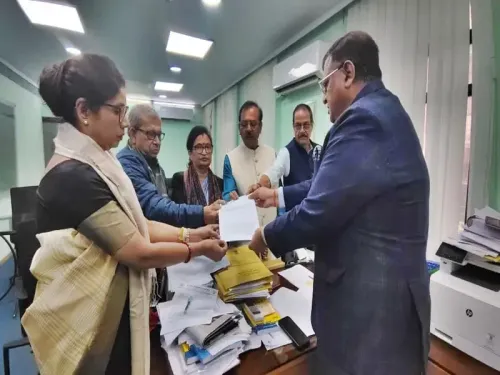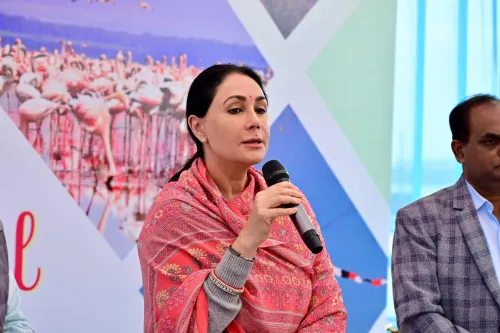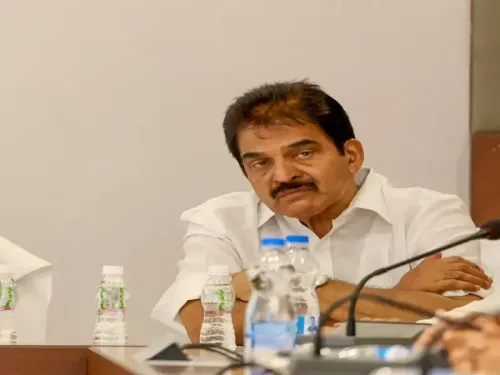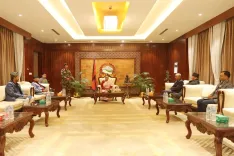Under PM Modi's Leadership, Government Aims for Swift and Transparent Justice: HM Shah
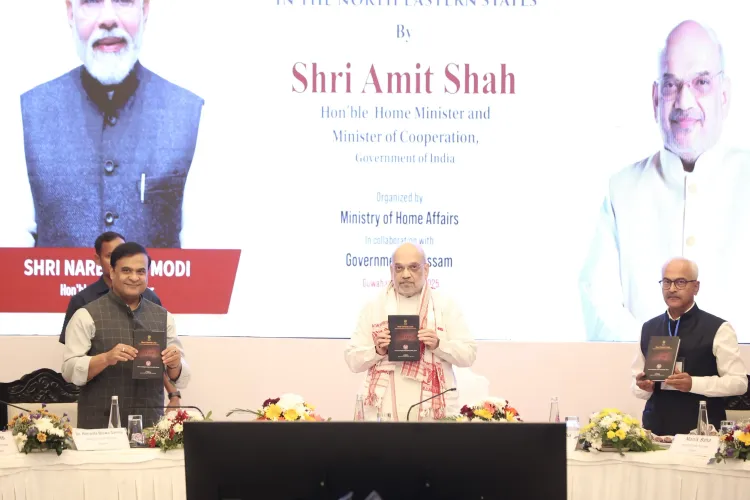
Synopsis
Key Takeaways
- Government's Commitment: Swift and transparent justice system under PM Modi.
- Focus on Timely Crime Registration: Essential for law and order.
- Implementation of New Laws: Review meetings to be held regularly.
- Training for Police: 100% personnel to be trained on new laws.
- Community Justice: Police stations to serve as justice venues.
Guwahati, March 16 (NationPress) Union Home Minister Amit Shah on Sunday stated that under the guidance of Prime Minister Narendra Modi, the Central government is dedicated to ensuring a swift and transparent justice system for all citizens. He stressed that to reinforce law and order, it is crucial to register crimes without delay.
Leading a review meeting regarding the implementation status of three new criminal laws in the northeastern states, held in Guwahati, the Home Minister noted that these states must intensify their efforts in executing the new criminal regulations.
He remarked that the full enforcement of these laws would significantly enhance the law and order landscape in the region, allowing for justice to be served by the Supreme Court within three years of an FIR being filed in any case. Officials indicated that the meeting addressed the implementation and current status of various new provisions concerning police, prisons, courts, prosecution, and forensics in the northeastern states.
This meeting, which took place at a hotel in Guwahati, saw the participation of the Governor of Manipur and the Chief Ministers of Assam, Arunachal Pradesh, Meghalaya, Mizoram, Nagaland, Tripura, and Sikkim.
Also present were Union Home Secretary Govind Mohan, Chief Secretaries, and Director Generals of Police from these northeastern states, alongside the Director General of the Bureau of Police Research and Development (BPRD), the Director of the National Crime Records Bureau (NCRB), and other senior officials from the Ministry of Home Affairs (MHA) and state governments.
The Home Minister unveiled a publication entitled ‘New Criminal Laws: Standard Operating Procedures and Rules’, compiled by CID, Assam.
HM Shah insisted that there ought to be no political interference in the registration of cases pertaining to terrorism, mob lynching, and organized crime.
He urged that all northeastern states ensure the training of 100 percent police personnel on the new criminal laws.
The Home Minister requested the Chief Ministers of these states to convene a review meeting monthly regarding the implementation of these laws, directing the Director Generals of Police and Chief Secretaries to conduct reviews every 15 days.
He highlighted that the administration of the three new criminal laws must reach the grassroots level, transforming police stations into venues where citizens receive justice.
He asserted that this would only be feasible with the complete implementation of the three new laws.
Commending the Assam government for ensuring the filing of charge sheets within the mandated timeframe of 60-90 days in 66 percent of cases, he urged other states to adopt similar practices.
He underscored the necessity for ongoing monitoring of progress in this area. Stressing the urgent need for the implementation of e-Sakshya, HM Shah noted that without adequate scientific officers, it will not be possible to submit fully satisfactory charge sheets from a forensic standpoint.
HM Shah further advocated for the use of the “Trial in Absentia” provision, which would facilitate the return of fugitive criminals to the country.
Recognizing that the police in the northeast have historically concentrated on combating insurgency, he suggested that establishing a more robust Directorate of Prosecution would simplify the process of ensuring justice for the populace.
However, with insurgency now largely eradicated in the region, he stated that police should redirect their attention towards safeguarding lives, property, and dignity.
HM Shah also mentioned that the Modi government introduced three new laws following a thorough deliberation process lasting nearly 45 months.
The three new laws, Bharatiya Nyay Sanhita (BNS), Bharatiya Nagarik Suraksha Sanhita (BNSS), and Bharatiya Sakshya Adhiniyam (BSA), which were enacted last year, replaced the Indian Penal Code (IPC), Code of Criminal Procedure (CrPC), and the Indian Evidence Act as of July 1 this year.
The Home Minister participated in a series of events in Assam and Mizoram since Friday (March 14) and departed from Guwahati for New Delhi on Sunday night after concluding the significant meeting on the three new criminal laws with the Chief Ministers of the northeastern states.


